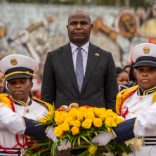Ministry re-verifies pension payroll to eradicate ghost combatants
Mozambique: Frelimo approves, opposition votes against – 2021 State Budget and PES

Photo: Noticias
The Assembly of the Republic yesterday (03-11) approved both the Economic and Social Plan (PE) and the State Budget for 2021. Opposition parties Renamo and MDM voted against, arguing that the two instruments are unrealistic.
The Economic and Social Plan and the State Budget for 2021 were approved by Parliament in Maputo this Thursday (03-11) on the basis of the votes of the ruling Frelimo party. Mozambican Prime Minister Carlos Agostinho do Rosário looks at 2021 with optimism, despite the adverse context of Covid-19. In the words of the prime minister, the recovery of the world economy and the gradual resumption of external financing to the state budget will contribute to Mozambique achieving positive results.
“[We foresee] economic growth of 2.1%, maintaining average annual inflation in single digits, around 5%, reaching US$3.8 billion in exports and constituting international net reserves to cover 6 to 8 months of imports in non-factorial goods,” Carlos Agostinho do Rosário said.
Minister of Economy and Finance, Adriano Maleiane, told parliament that the budget deficit is estimated at around 102 billion meticais (€1.3 billion), which corresponds to 9.1% of Gross Domestic Product (GDP). “An important aspect to highlight in this state budget is that current revenues are higher than expenditures,” Maleiane said.
Regarding the health sector, Minister Tiago said that the country has joined the COVAX initiative, which will allow swift and equitable access to vaccines against Covid-19 in collaboration with the World Health Organization (WHO). “Mozambique should under this mechanism receive about six million doses of vaccines for 20% of the current population, which is estimated at 30 million,” he explained.
Armindo Tiago also assured that Mozambique has a stock of medicines sufficient for the next three months and expects to receive a new order of drugs to cover the needs for six months.
Opposition with many doubts
Frelimo and opposition parliamentary benches differed in their assessment of the 2021 Economic and Social Plan and the State Budget.
The ruling party says that the government will continue to allocate resources to the various sectors with a view to reducing social inequalities while strengthening the capacity of defence and security forces and maintaining Covid-19 preventive measures.
“Human capital is the first priority of this 2021 economic and social plan,” Frelimo deputy Aires Aly noted.
Renamo voted against the government’s budget proposal, explaining that the document gives priority to the Presidency of the Republic and to the presidential ‘Casa Militar’ to the detriment of the social and economic sectors in the country.
“The current proposal does not consider desirable the great challenge for Mozambicans: to de-politicise the state apparatus and eliminate the political persecution of opposition members,” Renamo deputy Carlos Manuel said.
The MDM maintained that young people would still be abandoned and without job opportunities. According to deputy Fernando Bismarque, the government continues to relegate to civil society the responsibility of assisting victims of armed violence in the centre and north of the country. “Psycho-social assistance to these families is urgent,” he said.
Too much spending on the state apparatus?
According to Adriano Nuvunga, coordinator of the Budget Monitoring Forum (FMO), the state budget proposal is not calibrated to true Mozambican reality. “The budget continues to provide for higher expenditure at the central level. This has been the Achilles’ heel,” he warned.
Nuvunga also noted with concern that the budget provides a “very small” amount for social protection. “This sector has always been neglected, which is why we continue to say that Covid-19 numbers have reached this point, because people have not been reached. And this pattern remains, here in the 2021 budget,” he underlined.
In relation to this, Minister of Economy and Finance Adriano Maleiane said that, although the budget was often centralised in absolute terms, in practice this is not what happened, because during its execution it ended up being decentralised.












Leave a Reply
Be the First to Comment!
You must be logged in to post a comment.
You must be logged in to post a comment.